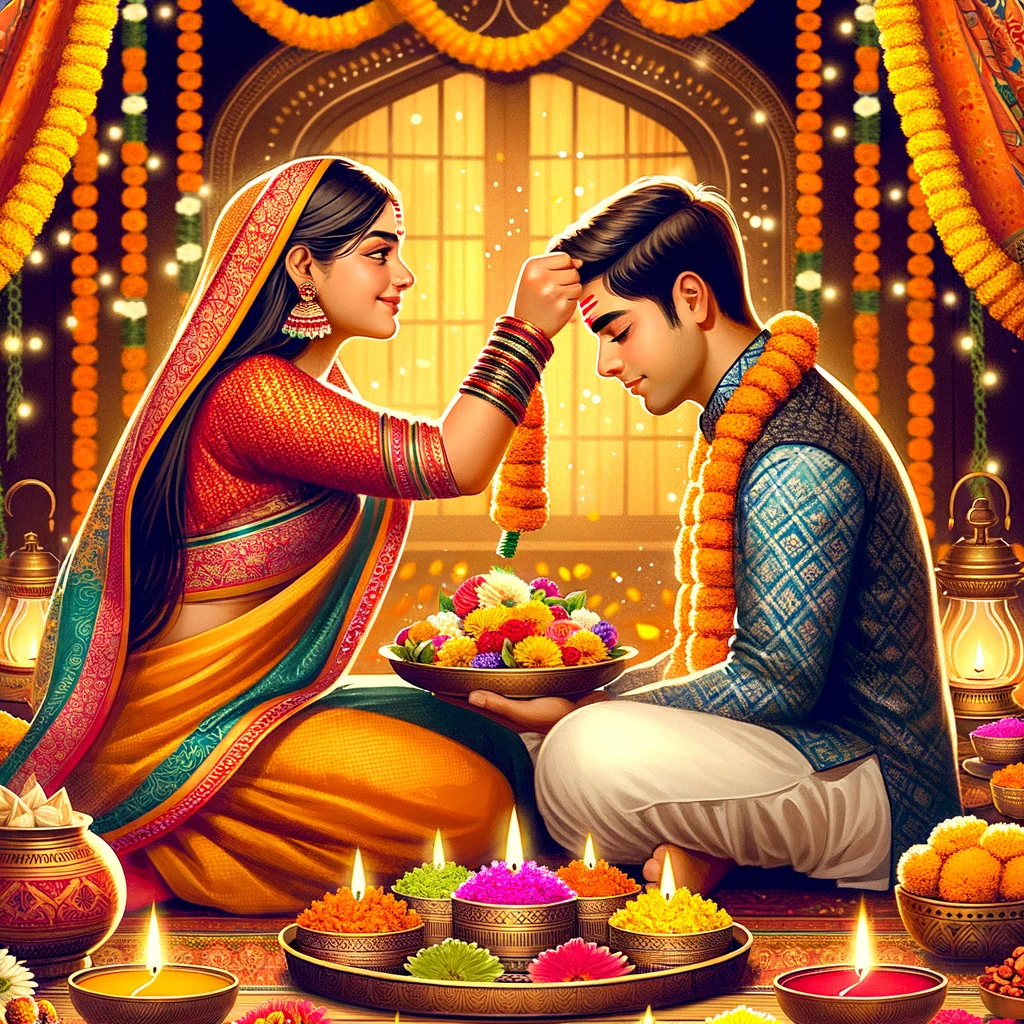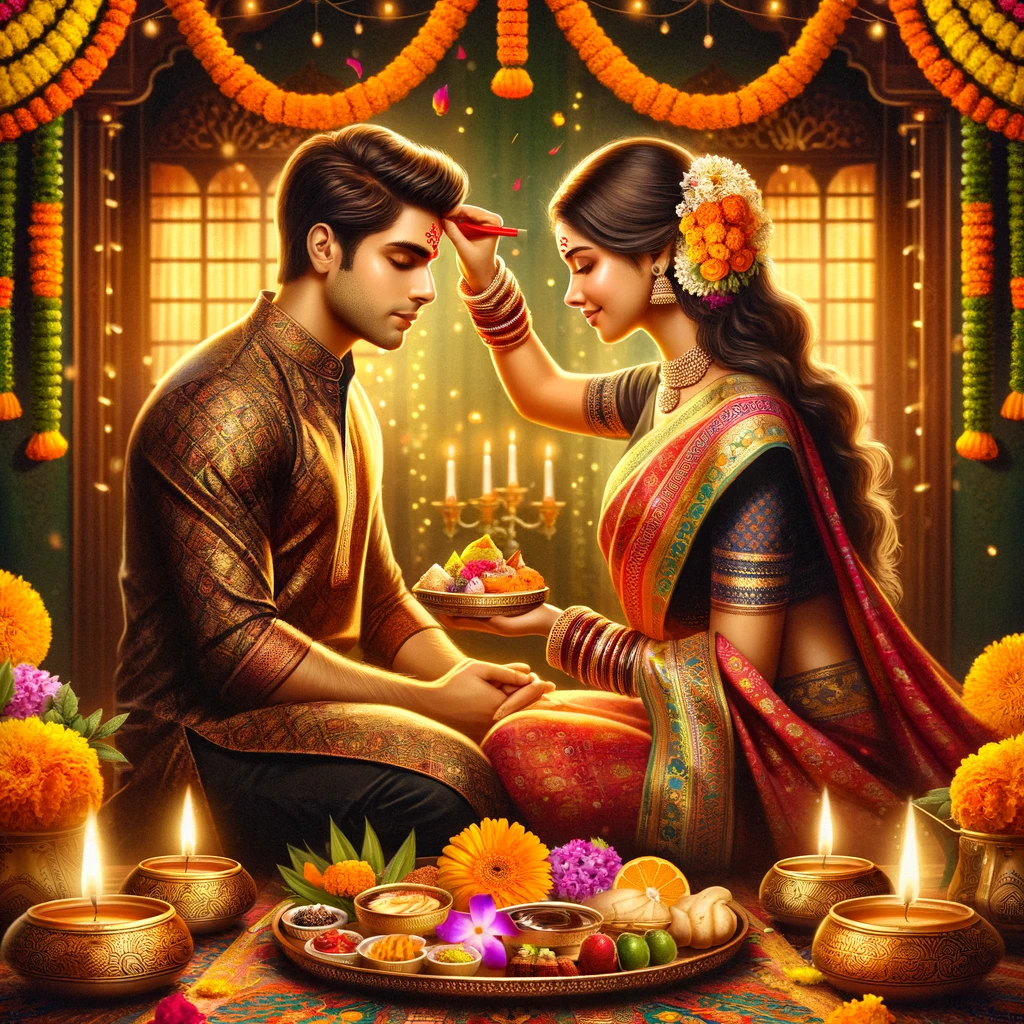“Bhai Dooj,” also known as “Bhai Tika” or “Bhai Phonta,” is a festival celebrated in India and Nepal that symbolizes the love and affection between brothers and sisters. It is similar to the festival of Raksha Bandhan but has its unique rituals and significance.
The Story Behind Bhai Dooj
The festival of Bhai Dooj is rooted in Hindu mythology with several legends associated with it. One of the most popular stories is that of Lord Krishna and his sister, Subhadra. After Krishna defeated the demon Narakasura, he visited his sister Subhadra, who welcomed him with flowers, sweets, and an aarti. She also applied a holy protective mark, or ’tilak,’ on his forehead. This act of affection and care is believed to be the origin of the Bhai Dooj festival.
Read More:
Another legend involves Yama, the god of death, and his sister, the river Yamuna. It is said that Yama visited his sister on this auspicious day, and she put an auspicious mark on his forehead for his well-being. Pleased by her affection, Yama declared that any brother who receives a tilak from his sister on this day will enjoy longevity and prosperity. This mythological event is also celebrated as Yama Dwitiya.

Why Bhai Dooj is Celebrated
It is celebrated to honor the bond between brothers and sisters. It is an occasion for siblings to come together and celebrate their familial ties, with sisters praying for their brothers’ long life and prosperity, and brothers promising to protect their sisters. This festival strengthens the bond of care and affection between siblings.
When Bhai Dooj Is Celebrated
It is observed on the second lunar day of Shukla Paksha (bright fortnight) in the Hindu calendar month of Kartika, which typically falls between October and November in the Gregorian calendar. It is celebrated two days after Diwali, the festival of lights.
Bhai Dooj 2023 Date and Time
The festival of Bhai Dooj in 2023 will be observed over two days, on Tuesday, November 14, and Wednesday, According to the Panchang, the Dwitiya Tithi starts on November 14th at 02:35 PM and ends on November 15th at 01:47 AM. The auspicious timings for Bhai Dooj are from 01:10 PM to 03:19 PM on November 14th and from 10:45 AM to 12:05 PM on November 15th.
| Event | Date | Muhurat Time Start | Muhurat Time End |
|---|---|---|---|
| Bhai Dooj | November 14th | 01:10 PM | 03:19 PM |
| Bhai Dooj | November 15th | 10:45 AM | 12:05 PM |
How It Is Celebrated
On the day of Bhai Dooj, sisters and brothers gather together, often in the sisters’ homes. The rituals include:
– Sisters apply a tilak or a protective mark on their brothers’ foreheads.
– Aarti is performed, wherein a platter with lighted lamps is ritually rotated around the brothers’ faces, accompanied by prayers for their well-being.
– Gifts and sweets are exchanged between siblings to express their love and affection.
– Special dishes and sweets are prepared for the occasion.
– In return, brothers offer gifts to their sisters as a token of love and assurance of their protection.

In some regions, brothers visit their sisters who are married and bring gifts for them and their families. This visit is an important aspect of the celebration as it reinforces the connection between the siblings and their extended families.
The celebration of Bhai Dooj varies slightly across different regions of India. For instance, in Bengal, it is known as “Bhai Phonta,” where sisters apply a sandalwood paste ‘phonta’ on their brothers’ foreheads. In contrast, in Nepal, the festival is called “Bhai Tika,” and involves a more elaborate ritual including a seven-colored tilak and a special garland made of marigold flowers.
Conclusion
Bhai Dooj is a celebration that transcends mere ritual, embodying the emotional and cultural ethos of the Indian subcontinent. It is a day that reinforces the protective bond between brothers and sisters, echoing the familial structure that is deeply rooted in society. The festival also signifies the societal respect for the familial roles of brothers and sisters, highlighting the importance of family in the cultural fabric of the region.
FAQs
Q: What is Bhai Dooj?
A: Bhai Dooj is a Hindu festival that celebrates the bond between brothers and sisters. It is observed during the Shukla Paksha (bright fortnight) of the Kartik month in the Hindu lunar calendar.
Q: When is Bhai Dooj in 2023?
A: Bhai Dooj is celebrated over two days, with the main festivities taking place on the second day. In 2023, Bhai Dooj will be observed on November 14th and 15th.
Q: What rituals are performed on this day?
A: The main ritual involves sisters applying a tilak or tika on their brothers’ foreheads and performing an aarti for their well-being. Brothers, in turn, promise to protect their sisters and often give gifts.
Q: Can Bhai Dooj be celebrated on both November 14th and 15th?
A: Yes, due to the lunar calendar and regional variations, Bhai Dooj can be celebrated on both days. It is best to follow the local customs or consult a local calendar.
Q: What is the significance of Bhai Dooj?
A: It symbolizes the love and bond between siblings. It is believed that celebrating this day strengthens the relationship and brings prosperity and longevity to the brothers.
Q: Are there any specific foods associated with Bhai Dooj?
A: While there are no specific foods, it is customary for sisters to prepare their brothers’ favorite dishes. Sweets are commonly exchanged as a part of the festivities.
Q: What if I am unable to meet my brother/sister on this day?
A: If you are unable to meet in person, you can perform the rituals virtually or send your wishes through messages or calls. It’s the sentiment that counts.
Q: Is it similar to Raksha Bandhan?
A: Both festivals celebrate the bond between brothers and sisters, but they are distinct. Raksha Bandhan involves tying a rakhi (sacred thread) on the brother’s wrist, while Bhai Dooj involves a tilak ceremony.
